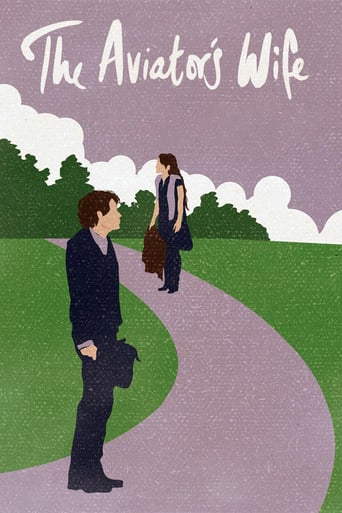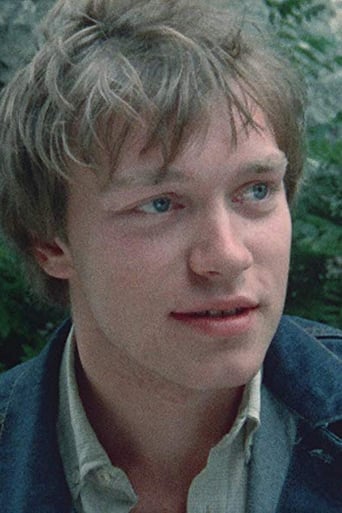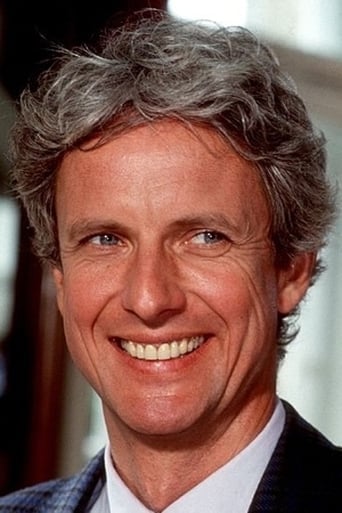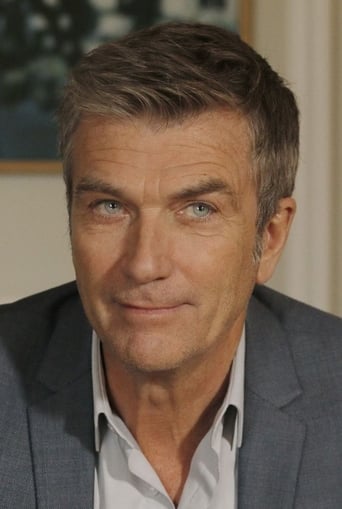Supelice
Dreadfully Boring
SeeQuant
Blending excellent reporting and strong storytelling, this is a disturbing film truly stranger than fiction
Robert Joyner
The plot isn't so bad, but the pace of storytelling is too slow which makes people bored. Certain moments are so obvious and unnecessary for the main plot. I would've fast-forwarded those moments if it was an online streaming. The ending looks like implying a sequel, not sure if this movie will get one
Guillelmina
The film's masterful storytelling did its job. The message was clear. No need to overdo.
kickall
It's always fun watching Rohmer's heroes and heroins develop their characters in a 90-min of story-telling.The aviator Christian shows up talking for 5 minutes in the beginning, and then he turns to just a subject that we all audience, including François, have to know him from how Anne will describe him and how Lucie will envision him.The audience can only see aviator's wife once from a photo Anne posses, but till we see it, including François, we learn all of our assumption made from Lucie's smart guessing will need to be re-assumed otherwise.The last five minutes of the movie indicates François will get himself to be going after Lucie, for he is made believe Lucie may not seem as straightforward as he felt. His role somehow imitates to Christian now.So much fun with so minimal resources of moving making. Solute Eric.
Dennis Littrell
In this bittersweet tale of disconnections and possibilities perhaps we have the essence of the art of Eric Rohmer. If you have only one Rohmer film to see, perhaps you ought to make it this one because it is so very, very French, so interestingly talkative (one of Rohmer's trademarks) and so very, very Rohmer.The Aviator's wife, incidentally does not appear except in a photograph, but that is all to the point. Everything is a bit off stage in this intriguing drama: love especially is a bit off stage. And yet how all the participants yearn.Marie Riviere stars as Anne who is in love with the aviator. We catch her just as she learns that he no longer wants her. He tells her that his wife is pregnant and so he must return to her. Meanwhile, she is being pestered by Francois (Philippe Marlaud) who is in love with her. However he is a little too young and "clinging." Truly she is not interested. It is a disconnection as far as she is concerned.The heart of the film occurs when Francois is following the aviator and the blond woman. Francois is obsessive and jealous. He follows because...it isn't clear and he really doesn't know why except that this is the man that Anne loves. As it happens while he is following them he runs into a pretty fifteen-year-old (Lucie, played fetchingly by Anne-Laure Meury) who imagines that he is following her. She turns it into a game, and again we have a disconnection. She is fun and cute and full of life, but he cannot really see her because he pines for Anne. Meanwhile Anne of course is pining for the aviator.Rohmer's intriguing little joke is about the aviator's wife. Who is she and what is she like? We can only imagine. And this is right. The woman imagines what the other woman is like, but never really knows unless she meets her.Maire Riviere is only passably pretty, but she has gorgeous limbs and beautiful skin and a hypnotic way about her, which Rohmer accentuates in the next to the last scene in her apartment with Francois. We follow the talk between the two, of disconnection and off center possibilities, of friends and lovers with whom things are tantalizingly not exactly right and yet not tragically wrong. As we follow this talk we see that Anne's heart is breaking or has broken--and all the while we see her skin as Francois does. She wants to be touched, but not by him. And then she allows him to touch her, but only in comforting gestures, redirecting his hands away from amorous intent. And then she goes out with a man in whom she really has no interest.Such is life, one might say. Rohmer certainly thinks so.One thing I love about Rohmer's films is that you cannot predict where they will go. Another thing is his incredible attention to authentic detail about how people talk and how they feel without cliché and without any compromise with reality--Rohmer's reality of course, which I find is very much like the reality that I have experienced.See this for Eric Rohmer whose entre into the world of cinema is substantial, original, and wonderfully evocative of what it is like to live in the modern world with an emphasis on personal relationships and love.(Note: Over 500 of my movie reviews are now available in my book "Cut to the Chaise Lounge or I Can't Believe I Swallowed the Remote!" Get it at Amazon!)
philipdavies
The person of whom we know least is the aviator's woman. This is largely because the emotional topology is neither simple nor relatively stable like the triangular formula it first appears to be.François is too matter-of-fact to go with the flow of this gestalt of rapidly metamorphosing relationships. Like a latter-day Polyphemus, he drowses dimly through a hazily-grasped landscape of romantic artifice, and always fails to get the girl through the folly of an approach so direct as to be lumbering. Because he is so ponderous, Lucie teases him, to relieve her impatience.François threatens the essentially gossamer-like dance of youthful romance – the flirtatious touch-and-go of creatures as yet unburdened with any sense of their mortality. But he also burdens the older Anne with his stolid inability to hurry after and keep company with her advancing sense of years and maturity. He lightly observes to Lucy in the park that he is, chronologically, stuck exactly midway between two women, but it is the formula and not its significance which strikes him.He sleepwalks across a wideawake Paris, from yesterday's literally exhausted love, to the dawning of a new love at a temporal juncture which unfortunately for him does not coincide with the pattern of his shift-distorted days. In a tragic conclusion to this farce of an elementary failure of communication, the student who must work his way through college is shown as forever excluded from the smooth and easy path set before the privileged children of the haut-bourgoisie. Indeed, there is a double tragedy, as Anne still appears to be languishing in an at least emotionally unresolved divorce, and yet age has put her asunder from François, thus robbing both of their natural and mutual haven from those whose fortunate background will ensure that everything will come to them as a matter of course.This is the dark side of Rohmer's generally more sunny world of gently bittersweet dalliance: The film shows the point at which all the lightness must become serious. The pilot and his woman – is she wife? sister? mistress?professional associate? – seem to preside from an aloof and unknowable distance, like Arcadian deities over the cruel twisting of human destiny.Their inexplicable appearances and disappearances mirror the faltering course of human affairs, which do leave most of us more-or-less in the lurch.There is a Mozartian harmony to this conception of how life produces not only winners, but losers as well, yet losers who are not obviously the wilful creators of their own fate. As a portrait of the apparently random strokes of fortune, dealt by the endlessly absconding figure of the vaguely heaven-located ‘aviator,' this film could even be said to breath the air of Classical Greece ... were Rohmer not so conscious of the artifice as to locate the impossible flirtation of Lucy and François in a park all of the bucolic features of which are entirely artificial. Amidst all the pretty lies, one thing is certain: Disillusionment.
Yet Rohmer seems to believe – as the subtitle of this film suggests – that such a bleak world of conceptual emptiness would be literally unimaginable for the artist, unsupportable for the creative intelligence. Quintessentially French, it is the rational play of wit that satisfies and expresses this cool, classical sensibility. Here, he deliberately objectifies the limits of his own talent, or human-interest: It is an admittedly delightful formula bounded on one side by the beautifully illuminated world of the aquarium by Anne's bedside, and on the other by the crystalline confection of the snow-shaker in François' nervously occupied hand as she ‘freezes him out', but it is a formula, nonetheless, and can only describe the imagined regions of those with the temporal luxury – the time – to develop such a rareified sensibility.Neither shiftworkers nor disappointed women – the one cruelly pressed for time, the other by it - can luxuriate in that fundamentally aristocratic sense of the infinite possibilities of self – the sense which gives to so many of Rohmer's films their particular quality of timeless dalliance. This is a game for kittenish teenage girls and their attentive swains, and it presents them with no immediate consequences. It is, in short, amidst those who are still young and therefore truly alive that Rohmer wishes to remain. In this film he acknowledges the cruelty implicit in the intuition that life ceases once consequence is encountered. He has created a Garden of Eden in his delightful films of the delicate blooming of relationships, but in ‘La femme de l'aviateur' he has pre-figured the inevitable temporal fall of this first waking dream of those young creatures who early stretch in the sun's first, kindly, rays, in fields that seem made especially for their innocent sport.The aviator's woman is like the rainbow's trajectory: The occasion of charming speculations, which can only be pursued, but never satisfied. Don't be misled by Rohmer's ‘documentary style.' He is a poet, not a realist. Or rather, perhaps, he is the documentarist of the evanescent, the ephemeral – like the green flash of sunset in his ‘Le rayon vert.'Perhaps this director expresses that very French nostalgia for the ideal aristocratic society of Romance – an impossible political Eden, therefore? And a somewhat guilty pleasure, on the evidence of. ‘La femme de l'aviateur.' Yet what sensual pleasure is there but eventually leaves us sadder than we were?Like that annual holiday which we dream of all the rest of the year, and which figure prominently in Rohmer's films, or like that hoped-for holiday romance undefiled by the unromantic intrusions of the daily grind, we are glad to be indulged by the prospect of escape, even though we know perfectly well that it will all come back to earth again with more or less of an unpleasant bump. Unusually for Rohmer, in this instance we are made very conscious of the disappointing nature of everyday reality during the course of the film. This atypicality, wonderfully, rather strengthens the artistic integrity and value of what the director wishes to do in the rest of his oeuvre. Maybe nostalgia for our lost Edens is, after all, sufficiently distinct from a defective grasp of reality to prevent our losing our heads...?
frankgaipa
I could call this one of my favorite Rohmers, but there isn't one about which I wouldn't say that. Somewhere I've read that Rohmer's male characters are less perfectly, or maybe it's less caringly, drawn than his female. Yet I don't think there's one whose mistakes, harms, self-deceptions I haven't either fallen into or sidestepped one time or another. "Aviator's Wife" flows to and then from a single easy-to-miss but magically telling moment, worked by sprite of the park, Lucie, in the post-park café across from the building into which the aviator has temporarily disappeared. François nods off for a second or two. With a touch on the cheek, Lucie wakes him, immediately, and tells him it's been ten minutes. Circumstance and moment trap him into believing, believing spontaneously like a babe, even though he hasn't believed a word from his Anne all day. Up until the final reel, Rohmer seems to be working to make us dislike Anne, even as our embarrassment for François brings us close to hatred for him. Anne's tired from the start, weary and wary of men who think they're in love. I was shocked that she's only 25, just as I was that wise Lucie is only 15 (and that François is as many years as he is past, say, 12). Even understanding the self-interest and harmfulness of François' self-deception, it's hard not to wince at Anne's defenses, however wise and justified they are. Better to savor the funnily wise Lucie. For twenty-plus years until this recent viewing, I remembered Lucie but could only picture Anne. Anne in my memory: dark unruly hair, bony, going to or leaving a lonely single bed, like a convalescent. I remembered her as having a cold, yet she doesn't.The film's proverb is "It's impossible to think about nothing." Long ago in a language class, a language I never carried through with and retain very little of, when the gruff prof challenged me, "Stop hesitating!" I got up the nerve and the unlikely spontaneity to complain understandably in the language, "I stop to think when I speak English. This is normal for me. Why can't I hesitate in ________?" "When you speak ________," he shot back without missing a beat, "don't think!" François and, perhaps more justifiably, Anne dig their respective holes because neither of them can manage not to think, neither can successfully think "rien."But Rohmer's never so simple, so expository. That moment in the café, caught unthinking, François is deceived. Trivially, but deceived all the same. Does that instant overturn the proverb? Don't know.





